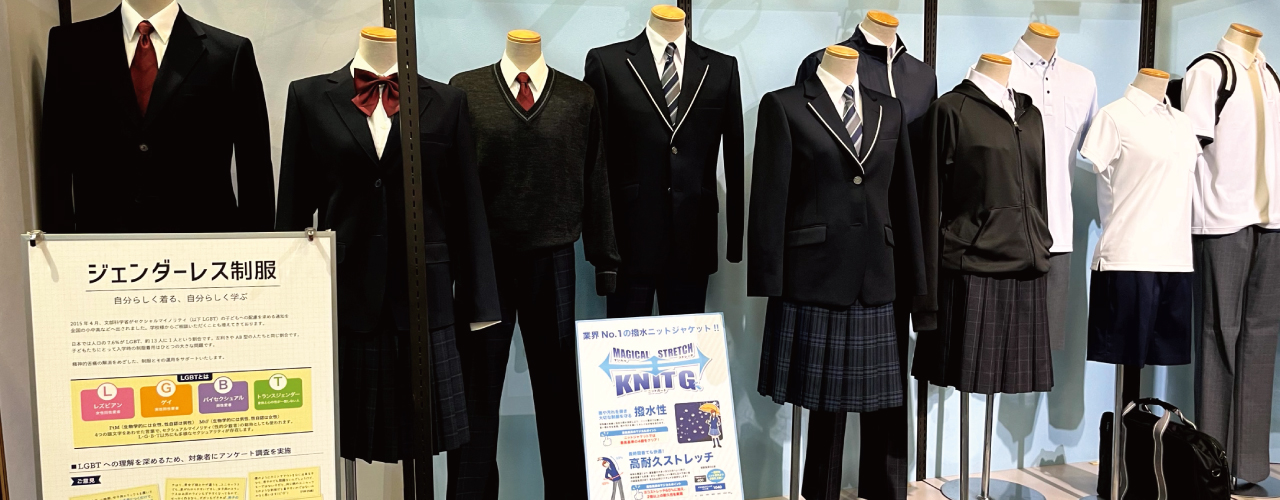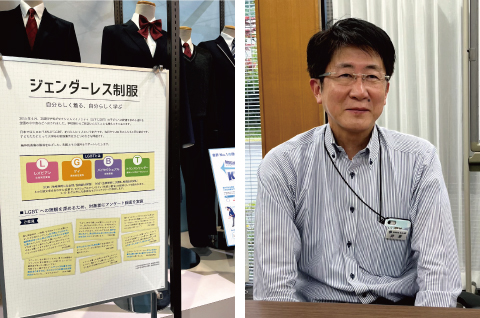
Pattern Matching Premium supports ultra-high-mix,
low-volume manufacturing suited to the gender-free era.
TOMBOW Co., Ltd.
Founded in 1876, TOMBOW Co. Ltd. initially began its operations with the production and sales of tabi footwear (split-toed socks). In 1930, the company began production and sales of school uniforms, and by 1955 it had expanded to include the production and sales of gym wear. Business then expanded to include nursing wear in 1997 and medical wear in 2009, and now the company's three main businesses consist of school uniforms, sportswear and healthcare. In each of those fields, TOMBOW has established a production system that not only allows manufacturing and quality control, but also ensures timely delivery as well.
The Origins of School Uniforms
School uniforms were first introduced in Japanese schools during the Meiji era (1868-1912), a period that coincided with the transition from traditional kimono to Western-style clothing. To symbolize the modernization of education, Western-style clothing, specifically the tsume collar, was adopted at Gakushuin and Imperial Universities. However, due to the historical context of the time, the transition to Western-style clothing for female students was not immediate and changes were gradually implemented over time. By the Taisho era (1912-1926), Western-style uniforms were adopted for both male and female students, leading to the widespread use of school uniforms.
By tracing the history of school uniforms, we can gain insight into the evolution of history and culture in Japan and the world. The Uniform Museum, established in 1996 by TOMBOW, showcases the history of education in Japan starting from the Asuka-Nara period (538-794), as well as the British military uniform, which is the origin of the modern school uniform.

Adapting Flexibly to Evolving School Identities
In 1976, TOMBOW pioneered the concept of unique school identities through distinct school uniforms, and has since maintained a high-mix, quick-delivery production system to meet the varying expectations of schools. Recently, from an LGBTQ perspective, the question of how school uniforms should adapt to diversity has been raised nationwide, leading to an acceleration in the transition towards gender-free uniforms. While the traditional image of school uniforms was distinct for male and female students, an increasing number of schools are now adopting the blazer/suit style for all gender-identities.
By providing the option to freely mix and match items without gender restrictions, TOMBOW can flexibly cater to a variety of needs, including those related to gender diversity. As a uniform manufacturer, its mission is to supply all students with comfortable and pleasing attire.

P-CAM®160 Pattern Matching Premium for Efficient and Accurate Small Lot Textile Cutting
The demand for slacks has gradually increased due to the popularity of gender-free uniforms. Furthermore, the variety of patterned fabrics, such as checks and tartan, has significantly expanded compared to the past, leading to a substantial rise in demand for pattern-matching cuts for bottoms. The key to satisfying this demand lies in the efficiency and precision of small-lot cutting.

The Pattern Matching Premium version of SHIMA SEIKI's P-CAM® series computerized cutting machines was therefore added to its facilities. For TOMBOW, the P-CAM® series was a long-standing and trusted tool, with 12 P-CAM® series cutting machines already working at its headquarters factory, and an additional 9 machines in operation at a different plant. One of the key benefits of utilizing SHIMA SEIKI computerized cutting machines is their ability to deliver high cutting accuracy with high speed, and for TOMBOW, the continuous cutting functions furthermore enable uninterrupted input and setup for cutting, effectively catering to its cutting needs.

Mr. Azuma, the Manager of the Product Control Section, stated, "The superior functionality and cost-effectiveness of P-CAM®, including its operational costs, set it apart from other companies' cutting machines and played a significant role in our decision to implement this machine. We also appreciate SHIMA SEIKI's proactive approach to maintenance and their commitment to developing new features. The 'unbreakable design,' a crucial aspect of a cutting machine, can only be realized by a product from a company that takes pride in its made-in-Japan quality."
The standard lead time for school uniforms is typically 7 to 10 days. However, during the peak season in March, when orders for school uniforms surge, TOMBOW has implemented a production system that temporarily reduces the lead time from 7 to 3 days. Furthermore, due to the high volume of repeat orders for school uniforms, the registration of over 5,000 fabric patterns, including pattern pitch, has effectively reduced lead time and improved cutting efficiency.
In addition to its high quality, TOMBOW has realized high-mix low-volume production with the shortest cycle of any other company. In this way the company strives to be the premier uniform manufacturer by upholding the foundation of the TOMBOW brand. Such high aspirations make TOMBOW an ideal industrial partner for SHIMA SEIKI.
Towards a Sustainable Society

Under the corporate slogan, "Creating valuable products that respect people and nature," TOMBOW is advocating sustainable corporate goals for fostering a sustainable society. Encouraging the use of natural raw materials as well as recycled polyester fiber derived from PET bottles, and implementing sublimation transfer printing using waterless dyeing, 62% of all its products are environmentally friendly. Furthermore, longevity of product life cycles is emphasized, not only through the use of durable materials and sewing specifications, but also through the application of "growth design" that allows for extended use of uniforms that can grow in size along with the student.
Preparing for the Future in the LGBTQ Era

TOMBOW has invited Mr. Shoichi Yamaguchi, founder of the LGBTQ activist group ELLY, to serve as an advisor in the development of gender-free uniforms that accommodate sexual diversity. TOMBOW Director Mr. Ihara stated, "As the trend towards blazers among the LGBTQ community is expected to continue, we anticipate an increase in multi-variety small-lot production of patterned fabrics. We currently have two sets of P-CAM®160 Pattern Matching Premium machines, but we may add more as the need arises. We are looking forward to further enhancements of SHIMA SEIKI's capabilities as we advance with the automation of cutting."
Having committed to enhancing people's lives through fashion and to responding flexibly to ever-evolving societal conditions, SHIMA SEIKI will continue to collaborate with TOMBOW with its advanced technology and production systems to shape a future where everyone can shine as individuals.

TOMBOW Co., Ltd.
| Established | 1876 |
| Location | Okayama/Tokyo, Japan |
| Type of business | Production and sales of school uniforms |
| Website | https://www.tombow.gr.jp/ |
We can tailor solutions to fit each customer's requirements.
Please feel free to contact us.
TOP>Products>Client testimonial>TOMBOW
